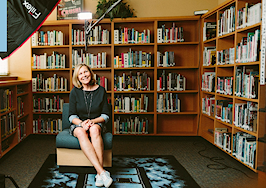In March, Ignite Visibility CEO John Lincoln released “Social Media Marketing: The Movie,” a 45-minute film where 10 social media experts explain how each of the top social media platforms work and share how to find success on each platform as a business owner.
“More than ever, people are waking up to the power of social media to grow their business,” Lincoln said in a statement. “But there’s a lot of confusion about how to get started, the subtleties of each platform and what is needed to set an overall strategy.”
Here’s what the CEO and social media expert had to say about creating a solid strategy:
1. You don’t have to be on every platform.
There are a plethora of social media platforms and tools real estate agents can use to expand their sphere, grow their influence and, ultimately, get more sales. With all these choices, it can be tempting to be “everywhere” at once, even if it’s not beneficial for your bottom line.
“What people try to do is do a little bit on a lot of sites,” Lincoln told Inman.
He said agents should only join platforms they feel comfortable with and provide an ample opportunity to connect with their audience. Lincoln also said agents should take a deep dive into how the platform works, understand the reason for the platform (e.g. Instagram creates engagement around photos) and study the platform’s user demographics.
If there’s a new platform you’re interested in joining, there’s no problem with creating an account and doing a little experimentation — but don’t spend your advertising dollars until you ask these questions:
- What’s the community size of the platform?
- How does it compare to other platforms?
- Is my demographic there?
- Can you grow a community there? If so, how big?
- What kind of clicks and traffic can you generate?
“You don’t want to start making it a part of your social media strategy if it’s going to take a lot of time and resources, and if you’re not going to get a direct return because your demographic isn’t there,” Lincoln said.
2. Accept that you’ll have to ‘pay to play.’
The days of garnering explosive organic (unpaid) traffic are gone, and the sooner agents can accept that new reality, the better. At one point, Lincoln explained, every person who liked your business page would’ve seen the majority of your posts, especially if you had a high relevancy score.
But in the face of “fake news” scandals, questions about data being improperly used by advertisers and spammy posts, Facebook has changed its algorithm to favor posts from family and friends, which has tanked organic traffic rates.
“Lincoln says a budget of $200–$750 per month is a great starting point for Facebook ad newbies, and that money can bring an extra 500 to 2,000 visitors to your site per month. Of course, agents can start out with basic content marketing and promotion and direct conversion (pay-per-click), but remarketing ads (ads to re-engage people who’ve visited your website or mobile app) and advanced targeting metrics tend to be more effective, especially for real estate professionals.
“There’s a lot of opportunities out there for real estate agents, but it’s all in the strategy, and it’s all about knowing the right way to execute,” he said.
3. Not making videos? You’re missing out.
Lincoln said videos are one of the most effective ways to build an audience and expand your influence and that real estate agents often have the perfect personalities for this medium. But some agents fail at video, not because of a lack of talent or content, but because of inconsistency.
“You want to have a regularly scheduled program, just like a TV show,” he said.
Instagram and Twitter are best for talking about the highlights of a home or a brief professional topic since there’s a one-minute limit on both platforms. LinkedIn has a 10-minute limit, and Facebook and YouTube allow creators to make videos of any length.
Lincoln said within the first 10 seconds of a video, agents need to explain what they’ll be discussing and why it’s important. Also, he suggests, agents should have a static title bar at the bottom of the screen that includes the video’s topic, such as “10 ingenious ways to generate leads.” Lastly, agents should end with an invitation to like, comment or subscribe.
Just like any other piece of content, Lincoln said agents will have to promote their videos with an advertising budget ranging anywhere from $5–$100 per video.
4. Never fully depend on social media.
Lincoln said all agents need to have their own website where they can aggregate and save all the content they’re making on social media because there’s no guarantee that any of these platforms will stick around — remember Vine?
“I’ve seen sites tank, I’ve seen sites get huge boosts, and these sites are always changing things,” he said. “The most important thing is not to rely on the social sites or external sites to build your business. That is one of the biggest mistakes I see people make.”













